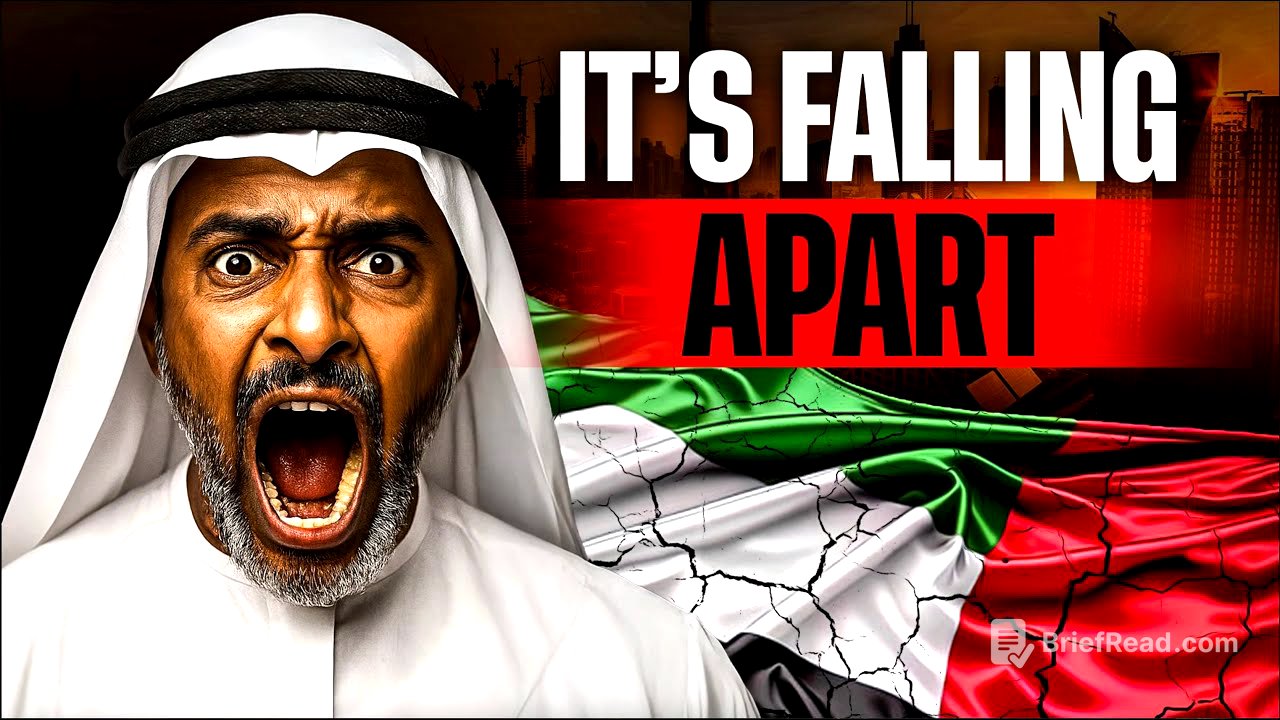TLDR;
This video examines Dubai's rapid economic growth and its emergence as a global hub for tourism, real estate, and trade. It also explores the underlying vulnerabilities that threaten its long-term stability, including a struggling real estate market, an expat exodus, rising debt, and over-dependence on tourism.
- Dubai's economy is heavily reliant on real estate, tourism, and trade, making it vulnerable to global economic shifts.
- The city faces challenges such as oversupply in the real estate market, an exodus of expatriates, and increasing debt levels.
- Regional competition from countries like Saudi Arabia and Qatar, which are developing their own tourism and business sectors, poses a threat to Dubai's dominance.
Dubai's Economic Rise [0:00]
Dubai has transformed from a desert town into a global powerhouse, becoming a major destination for business, tourism, and real estate. In 2024, it was the fourth most visited city globally, with nearly 19 million international tourists, contributing nearly 12% to its GDP. The city's real estate sector has attracted global investors with iconic projects like the Burj Khalifa and Palm Jumeirah. In 2025, real estate transactions increased by 26% from 2024, reaching 431 billion UAE dirhams. Dubai International Airport is the world's busiest for international passengers, serving over 92 million travelers in 2024, while the Jebel Ali port is a vital link between Europe, Asia, and Africa, contributing over 11.5% to the UAE's non-oil GDP. Dubai has also diversified into finance, tech, and trade, hosting over 30 free zones and attracting multinational corporations.
Real Estate Market Struggles [3:22]
Dubai's real estate market is facing significant challenges, reminiscent of the 2008 financial crisis. A construction boom led to over-borrowing and a real estate bubble, which burst when the global financial crisis hit, causing property prices to fall by nearly 50% and many projects to be canceled. Although the market recovered in the mid-2010s, another decline followed the 2014 oil price crash, with prices falling by nearly 30% between 2014 and 2020. Despite recent increases in villa and home prices, many units remain unsold due to oversupply and affordability issues. Luxury homes attract foreign millionaires, but do not support the local economy, while rising rents, averaging $67,000 a year for apartments, make it difficult for locals to afford housing. Many buyers are investors seeking quick profits, leading to speculation rather than sustainable growth, and the market is vulnerable to global interest rate hikes and economic uncertainty.
Expat Exodus [6:30]
A significant number of expatriates are leaving Dubai, revealing deeper economic problems. Expats, who make up around 90% of Dubai's population, have been crucial to the city's development, but many are now departing due to job losses and salary cuts during the COVID-19 pandemic. Oxford Economics reported around 900,000 job losses in the UAE in 2020, primarily affecting expats. This has led to decreased school enrollments, business closures, and increased credit card defaults. The strict visa rules, which require expats to leave within 30 days of losing their job, exacerbate the problem, particularly for middle-class families. The decline in spending and investment due to the expat exodus highlights a major weakness in Dubai's economy.
Rising Debt [8:31]
Dubai's growing debt is a hidden issue behind its luxurious facade. While the International Monetary Fund (IMF) reported Dubai's direct government debt at about $49 billion in 2023, the total debt, including that of government-linked companies, is likely over $80 billion. Companies like Dubai World borrowed heavily during the real estate boom, leading to a near-collapse in 2009 when it couldn't repay $26 billion. Abu Dhabi provided a $20 billion bailout, gaining more control over Dubai's decisions. A 2022 S&P Global report indicated that many government-related entities (GREs) still hold large hidden debts that don't appear in Dubai's official budget. Credit rating agencies and the IMF have warned that Dubai's finances may not be as strong as they appear, with the IMF estimating total public sector debt could be as high as 78% of its GDP.
Dependence on Tourism [11:03]
Dubai's heavy reliance on global tourism and travel poses another major risk. In 2024, Dubai welcomed over 19 million international visitors, surpassing pre-pandemic levels. However, the COVID-19 pandemic demonstrated the volatility of the tourism industry, with international travel restrictions leading to empty hotels and canceled events. Shifting demand, including a decline in Russian tourists due to sanctions and slower Chinese tourism due to economic uncertainty, presents a challenge. Regional competition from countries like Saudi Arabia and Qatar, which are investing heavily in tourism and entertainment, threatens Dubai's dominance. Dubai's tourism economy is heavily dependent on luxury tourism, making it vulnerable if wealthy travelers reduce their spending.









